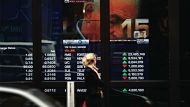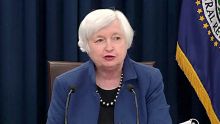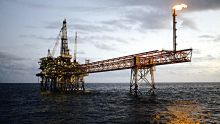Another trading session, another vicious bloodbath for bank stocks.
While in January global sharemarkets were seemingly at the mercy of the oil price, closely following its every meandering, the flavour of this month has changed to financials.
More BusinessDay Videos
Bank shares plunge in $40b ASX wipeout
Shares in the big four Australian lenders drop 4 per cent or more, leading a $40 billion sharemarket wipeout on Tuesday.
European investors experienced a particularly savage session on Monday, with Deutsche Bank buckling 9.5 per cent, dragging the German DAX index down 3.3 per cent. Wall Street took its cue from Europe and American bank stocks spiralled downwards: Goldman Sachs slid 7.5 per cent, while Morgan Stanley tipped over 6 per cent.
And like a neat domino effect, Australia's big four banks have slumped more than 3 per cent in morning trade, as investors brace for a continued bank sell-off.

But why have banks become the hot potatoes of sharemarkets? Indeed, investors have been digesting global economic woes, the Chinese slowdown and a slippery oil price for months now. So what exactly has investors fleeing the world's largest financial institutions?
Bank profitability in Europe
Bank stocks across Europe have shed 20 per cent so far this year, but this is about more than just bad debts, crashing energy prices or emerging market jitters.
Extraordinarily low interest rates in Europe have caused a chronic profitability crisis for banks. The profits banks make on loans are slashed when interest rates sink towards zero.
Judging by the hordes of investors fleeing European banks, they see this loose monetary policy environment sticking around for a while.

In fact, investors are getting to the stage where they are worried banks won't be able to repay their bonds on time. Following Deutsche Bank's surprise profit warning, credit default swaps ballooned as investors questioned whether banks will be able to meet the payments due.
"The questions of non-performing loans, as well as shrinking margins, are creating an increasingly difficult environment for European lenders," CMC chief market analyst Michael Hewson said in a note on Monday from London.
"And it would appear that investors are slowly waking up to the reality that negative rates aren't likely to help the profitability of a sector that is still dealing with the legacy of the sovereign debt crisis."
Negative deposit rates, which were introduced in December last year, could provoke banks to begin charging customers to deposit cash, which will move directly against the European Central Bank's policy. Investors aren't happy.
Sovereign wealth funds were set up for a rainy day and that rainy day has arrived.
Martin Gilbert, CEO, Aberdeen
Oil residue
Many banks are heavily invested in large oil projects. But since the price of oil collapsed, dozens of companies behind the projects have gone bust.
According to a list compiled by Houston law firm Haynes and Boone, 42 United States oil companies have filed for bankruptcy since the beginning of 2015 and more are likely to follow.
With the oil price languishing at 12-year lows, banks such as Wells Fargo, JPMorgan Chase and Citigroup are all stuck with billions in loans to the energy sector and are busily stashing hundreds of millions aside to cover potential losses in their oil and gas loans.
With Iranian production due to come online in the coming months, there doesn't seem to be much respite for the oil price. Until recently, China voraciously devoured the world's oil supply, but markets have become deeply concerned that the world's second-largest economy will demand less, leaving banks exposed to a commodity cycle without a foreseeable turnaround.
The liquidity desert
Since the US Federal Reserve ended its quantitative easing program in 2014 and especially after it began to lift interest rates in December 2015, liquidity in financial markets has been drying up.
New regulatory and capital requirements, implemented after the global financial crisis, have restricted bank trading activity and limited the amount of room banks have on their balance sheet to provide liquidity to markets.
This paralysis is compounded by a collapse in commodity prices, which sparked severe sell-offs in emerging markets and high-yield debt. This in turn shifted liquidity risk from the banks to the buy-side; banks weren't going to swoop in and buy up distressed assets because they were busy making sure they were better capitalised and therefore more resilient.
"The combination of these two factors has led to a somewhat vicious cycle and feedback loop, where poor liquidity is spreading, and liquidity problems appear to be turning into fundamental problems," Bank of America Merrill Lynch's head of US mortgages Chris Flanagan and strategist Mao Ding wrote.
"Moreover, tightening of monetary policy by the Fed, first through tapering and now through tightening, may have been necessary from an economic perspective, but the tightening appears to be adding fuel to the fire of liquidity deterioration."
Sovereign wealth funds
And as if there wasn't enough chaos in global financial markets, desperate for cash, the sovereign wealth funds of oil-producing nations are pulling money out of the market to fill budget shortfalls created by cheap oil.
Government-linked funds from the Middle East, Africa and Norway topped up on banking stocks, particularly European banks, when energy prices when higher but are now fiercely selling assets in a bid to offset oil prices.
"Sovereign wealth funds were set up for a rainy day and that rainy day has arrived," Aberdeen CEO Martin Gilbert told Bloomberg in January.
Since the collapse, these funds have added to market turmoil by drastically reducing their positions in banking shares. It has been estimated the sovereign wealth funds of the world's biggest oil producers are looking to offload more than $US200 billion ($282 billion) in global bonds and shares in 2016.
















0 comments
New User? Sign up